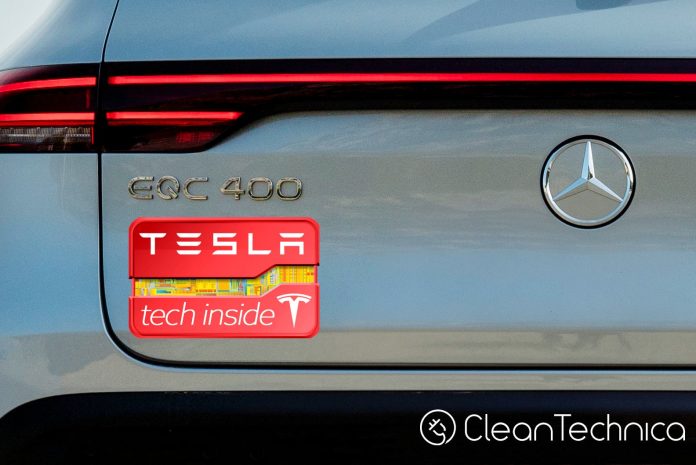By Ben Shulz & Kyle Field
Tesla CEO Elon Musk has always been fairly straightforward about his willingness to open up Tesla tech to other companies. For example, he publicly commented about the possibility of partnering with Mercedes on an electric Mercedes Sprinter in November 2018.
Maybe interesting to work with Daimler/Mercedes on an electric Sprinter. That’s a great van. We will inquire.
— Elon Musk (@elonmusk) November 19, 2018
This statement certainly wasn’t a fluke and is really just a natural extension of Tesla’s mission to advance the adoption of sustainable energy generation and electric transportation. With this mission in mind, it’s only logical to pursue ideas that scale Tesla’s superior electric vehicle platform as quickly as possible. In todays world, many electric vehicle manufacturers are pursuing electric vehicles by building a platform that other companies can use to build and grow their own business. Tesla made this promise even more real recently, with a new tweet from CEO Elon Musk confirming the company would be open to licensing its electric motors, batteries, power electronics, and even software out to competing automotive companies.
What is important to understand is that for a platform to be attractive, another company needs to be able to build an attractive commercial product on the platform. What company could build a very attractive product on the Tesla technology platform?
Mercedes & BMW
Both Mercedes and BMW have been structurally weakened in recent years, with each company having lost roughly 50% of their respective market caps since 2015. Even if they teamed up to tackle the electrification challenge, they would not be able to pull together the necessary resources to have any hope of catching up with Tesla’s technology in this decade. The story was different in 2015, and even in 2018, when they still could have bought into Tesla at a reasonable price, but now there is no doubt they have been beaten at their own game: building the best volume car at a premium price. Based on their respective share prices, it’s clear investors are of the same mind. Mercedes and BMW have no existing or future products that can compete with a Tesla.
In many ways, Mercedes and BMW are very similar to French or Italian luxury fashion labels. They still have great brands and have impressive skills in maintaining those luxury brands by continuing to improve on their interior and exterior vehicle designs, via great marketing, and by tuning the ride to their target groups.
Would customers love a Mercedes E-Class or BMW 5-Series built with Tesla technology inside? I’m pretty sure they would, as the interface the customer has with the brand (interior, exterior, status) would be the same. The look and feel of the cars themselves would not change. We saw this exact phenomenon when Mercedes contracted with Tesla to electrify the Mercedes-Benz B-Class for California customers. The vehicle ownership, driving, and maintenance experience is 100% Mercedes, but the electric powertrain, comprising a full 15% of the components in the vehicle, was supplied by Tesla. Some 8,000 of the vehicles were produced before it was shelved, and my wife has thoroughly enjoyed hers since 2014.
Licensing Tesla’s electric vehicle technology, from battery to charging to Autopilot, would mean having best-in-class tech. That is a natural fit with the experience Mercedes-Benz aspires to for all of the vehicles in its lineup. The pricing would be similar to Tesla’s, with a small premium for a higher degree of customization and the scent of old-world luxury.

Could a Tesla-powered electric vehicle be in the cards for Mercedes and BMW? Image credit: Chanan Bos, CleanTechnica
It seems like the next call placed by Daimler CEO Ola Källenius should be to Tesla CEO Elon Musk to discuss terms for the deal. Doing this would save Daimler several billion euros that they wouldn’t need to invest in their own software and battery tech (which would ultimately fail), while still allowing them to sell the best product. Tesla has demonstrated time and time again that it can and will continue to innovate at a faster pace than any other automaker is capable of. Why engage in a game of cat and mouse that can’t be won instead of just cutting a deal?
If Daimler and BMW are fast, they can even offer to convert some of their factory infrastructure into gigafactories with a shared equity investment — which Tesla (through it’s high market cap) could likely provide. Musk has also repeatedly called gigafactories “products,” rather than just factories.
Does this have any potential to become reality? As weird as it seems, Mercedes and BMW are running out of options — whether they like it or not. Any rational CEO would strongly consider this. Imagine having the opportunity to rewind the clock and knowing what we all know today about the success of the iPhone. If you were able to license Apple’s technology back in 2010, would you do so?
Have a tip for CleanTechnica? Send us an email: [email protected]


